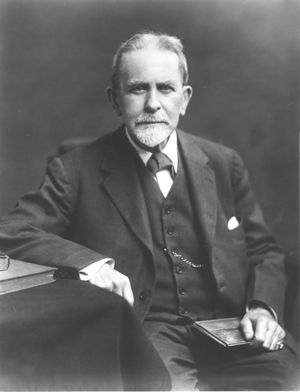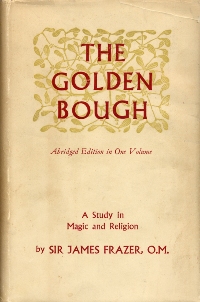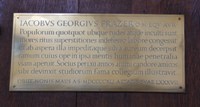Sir James George Frazer
1854-1941.  Anthropologist; author of The Golden Bough; considered one of the founding fathers of modern anthropology.
Anthropologist; author of The Golden Bough; considered one of the founding fathers of modern anthropology.
Born in Glasgow, J.G. Frazer studied at the University of Glasgow and Trinity, where he graduated in Classics (his dissertation would be published years later as The Growth of Plato's Ideal Theory) and remained a Classics Fellow all his life. He went on to study law at the Middle Temple and yet never practised. He was four times elected to Trinity's Title Alpha Fellowship, and was associated with the College for most of his life, except for one year, 1907-1908, spent at the University of Liverpool. He was knighted in 1914, and a public lectureship in social anthropology at the universities of Cambridge, Oxford, Glasgow and Liverpool was established in his honour in 1921. He was blind from 1930 on. He and his wife, Lily, died within a few hours of each other. They are buried at the Parish of the Ascension burial ground in Cambridge.
The study of myth and religion became his areas of expertise. Except for visits to Italy and Greece, Frazer was not widely travelled. His prime sources of data were ancient histories and questionnaires mailed to missionaries and Imperial officials all over the globe. Frazer's interest in social anthropology was aroused by reading E. B. Tylor's Primitive Culture and encouraged by his friend, the biblical scholar William Robertson Smith, who was linking the Old Testament with early Hebrew folklore.
 Frazer was far from being the first to study religions dispassionately, as a cultural phenomenon rather than from within theology. He was, however, the first to detail the relations between myths and rituals. His theories of totemism were superseded by Claude Lévi-Strauss and his vision of the annual sacrifice of the Year-King has not been borne out by field studies. His generation's choice of Darwinian evolution as a social paradigm, interpreted by Frazer as three rising stages of human progress — magic giving rise to religion, then culminating in science — has not proved valid. Yet The Golden Bough, his study of ancient cults, rites, and myths, including their parallels with early Christianity, arguably his greatest work, is still rifled by modern mythographers for its detailed information. The first edition, in two volumes, was published in 1890. The third edition was finished in 1915 and ran to twelve volumes, with a supplemental thirteenth volume added in 1936. He also published a single-volume abridgement, largely compiled by his wife Lady Frazer, in 1922, with some controversial material removed from the text. The work's influence spilled well over the conventional bounds of academia; the symbolic cycle of life, death and rebirth which Frazer divined behind myths of all pedigrees captivated a whole generation of artists and poets. Perhaps the most notable product of this fascination is T.S. Eliot's The Waste Land. More recently, it was an influence on the ending of Francis Ford Coppola's film Apocalypse Now (a copy of The Golden Bough figures in one of the final shots). Totem and Exogamy is also cited frequently by Sigmund Freud in Totem and Taboo: Resemblances Between the Psychic Lives of Savages and Neurotics.
Frazer was far from being the first to study religions dispassionately, as a cultural phenomenon rather than from within theology. He was, however, the first to detail the relations between myths and rituals. His theories of totemism were superseded by Claude Lévi-Strauss and his vision of the annual sacrifice of the Year-King has not been borne out by field studies. His generation's choice of Darwinian evolution as a social paradigm, interpreted by Frazer as three rising stages of human progress — magic giving rise to religion, then culminating in science — has not proved valid. Yet The Golden Bough, his study of ancient cults, rites, and myths, including their parallels with early Christianity, arguably his greatest work, is still rifled by modern mythographers for its detailed information. The first edition, in two volumes, was published in 1890. The third edition was finished in 1915 and ran to twelve volumes, with a supplemental thirteenth volume added in 1936. He also published a single-volume abridgement, largely compiled by his wife Lady Frazer, in 1922, with some controversial material removed from the text. The work's influence spilled well over the conventional bounds of academia; the symbolic cycle of life, death and rebirth which Frazer divined behind myths of all pedigrees captivated a whole generation of artists and poets. Perhaps the most notable product of this fascination is T.S. Eliot's The Waste Land. More recently, it was an influence on the ending of Francis Ford Coppola's film Apocalypse Now (a copy of The Golden Bough figures in one of the final shots). Totem and Exogamy is also cited frequently by Sigmund Freud in Totem and Taboo: Resemblances Between the Psychic Lives of Savages and Neurotics.
Frazer's six volume commentary on the Greek traveler Pausanias's description of Greece in the mid-2nd century AD remains one of his most important works although archaeological excavations have added enormously to our knowledge of Greece since his time. There is still much of value in his detailed historical and topographical discussions of different sites and his eyewitness accounts of Greece at the end of the 19th century.
| Memorial inscription | Translation |
|
IACOBVS GEORGIVS FRAZER O.M. EQV.AVR. Populorum quotquot ubique rudes atque inculti sunt OBIIT NONIS MAIIS A.S.MDCCCCXLI |
Sir James George Frazer, O.M., amassed with untiring scholarship details of the customs, rites and religions of every primitive and uncultured society in the world; from this thorny and impassable forest he plucked his Golden Bough, and with it opened an avenue into the secrets of the human mind. A Fellow for sixty-two years, by his open nature he made firm friends and by the fame of his works added lustre to the College. He died on 7th May 1941 at the age of eighty-six. |
James George FrazerBrass located on the south wall of the Ante-Chapel. |
Click on the thumbnail for a larger image. |
|
|
PREVIOUS BRASS |
|
NEXT BRASS Otto Robert Frisch |
| Brasses A-B | Brasses C-G | Brasses H-K | Brasses L-P | Brasses R-S | Brasses T-W |

